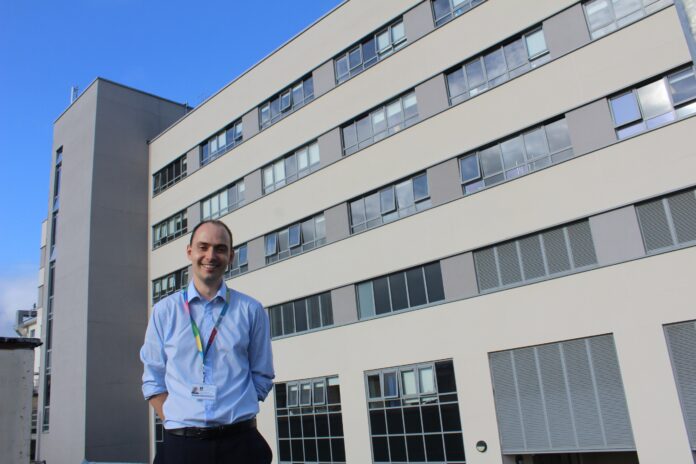COVID-19 testing capacity at University Hospital Limerick will be boosted by 70%, with two new emergency construction projects that form a significant regional component of the Government’s national pandemic strategy.
The works include a purpose-built COVID-19 laboratory (due for completion in early 2021), as well as a swabbing pod for hospital staff and pre-operative patients that opened this week.
Costing approximately €4m, the new COVID-19 lab will provide purpose-built physically separated areas for the four stages of the polymerase chain reaction (PCR) technique for DNA analysis. When fully operational, the new lab will increase by 150 tests per day UHL’s existing daily test capacity of approximately 200-220 tests.
With build-completion targeted for the end of January, and expected to become operational in Q1 of 2021, construction of the rapid-build modular laboratory commenced in mid-September, on a site to the rear of the hospital previously occupied by haemovigilance and quality portacabin offices.
That portacabin accommodation has been repurposed and relocated for the COVID-19 swabbing pod that began operating this week. The pod is located immediately after the staff traffic barriers, to the side of the Nurses Home building at UHL.
COVID-19 testing is the cornerstone of the Government’s public health approach to the pandemic, and the UHL projects are in line with national guidance specifically requiring an ongoing expansion of hospital laboratory testing.
A centrepiece of the new COVID-19 laboratory will be the Abbott ‘Alinity M’ diagnostic instrument, a fully automated sample-to-result system, weighing in excess of a ton. The Alinity M, which has been purchased by the HSE, will facilitate an increase of 150 additional tests per day at UHL.
Most of UHL’s COVID-19 testing equipment is temporarily located in the laboratory of the Clinical Education and Research Centre (CERC). When operational, the new lab will centrally house all this COVID-19 equipment, including another recently received test platform, the Luminex Aries, which will provide random access rapid test capacity.
A complement to PCR batch tests that have a fixed number of test runs per day, Luminex Aries testing can be conducted on a needs basis, performing up to 14 tests per run with results available within two hours. The instrument is currently undergoing validation tests on site in UHL.
Rapid testing provides a significant degree of flexibility for COVID testing at UHL, where the highest priority is patients admitted through the Emergency Department with suspected COVID. Earlier availability of test results facilitates swifter decisions on isolation, and earlier activation of treatment options for confirmed COVID-19 patients.
Luminex is an alternative supply chain to the existing UHL rapid test system, GeneXpert, whose manufacturer had reoriented some European supplies of test kits to regions of the globe where the pandemic was relatively uncontrolled.
The Luminex test kit and instrument supply chain was established through the National Clinical Program for Pathology, and its COVID-19 lead, Beaumont Hospital-based Immunologist, Dr Mary Keoghan.
Dr Patrick Stapleton, Consultant Microbiologist at UHL, said: “The UHL laboratory operates one of the busiest hospital COVID testing services in the country. Staff in the UHL serology and microbiology laboratories, supported by all laboratory disciplines, have built from scratch a COVID testing service that has consistently delivered fast, accurate test results for people attending UL Hospitals and for people in the local community.
“The recent welcome developments in buildings and equipment will allow our staff to continue to meet the intense demand by automating some labour-intensive steps in COVID diagnostics, and will permit further expansion in test capacity. The move to a purpose-built laboratory will greatly enhance molecular laboratory diagnostic capacity in the Mid-West during the pandemic and beyond.”
Tina Fitzgerald, Head of Unscheduled Care at UHL, welcomed the completion of the swabbing pod, which, she said, would give the hospital greater control in ensuring the safety of patients and staff during the challenging Winter ahead.
“We already have a COVID-19 Screening Team in place, managing the ordering of swabs for pre-operative patients and staff close contacts, as well as the contact tracing and triage process. The Swabbing Pod complements this team, and allows us to manage the entire process in-house.
“Although COVID will present challenges to the hospital this Winter, having the capacity to manage swabbing for our pre-operative patients and staff will assist in ensuring the safety of patients and staff in the hospital,” she said.












